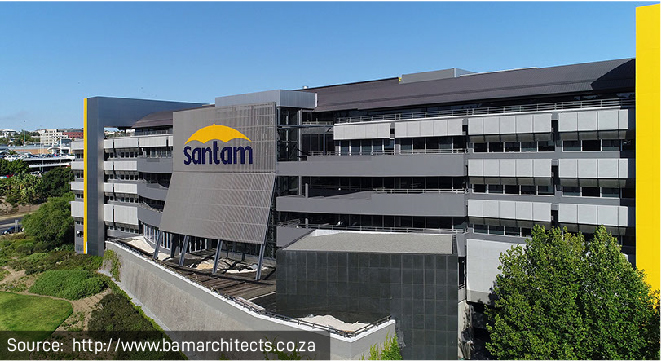Santam paid out R24.5 billion (2020: R21bn) in claims last year, the highest gross claims pay-out in its 104-year history, the country’s biggest short-term insurer said in its financial results for the year to the end of December 2021.
Despite the big claims pay-out, Santam’s earnings rose to R2.75bn, compared to R327 million in 2020, and shareholders have reason to smile again after receiving no dividends in the previous financial year.
Of the R24.5bn, R3.2bn went to contingent business interruption (CBI) claims, although this includes immediate relief payments of R1bn made in August 2020.
Santam said the Supreme Court of Appeal’s judgment on the length of the indemnity period to be applied to the Ma-Afrika Hotels and Stellenbosch Kitchen policies with CBI extensions provided the insurer with “clarity”, and it continues to make “steady progress” in finalising CBI claims.
At the end of December, Santam reduced its net provision for CBI claims by R450m to R2.55bn after reviewing its exposure to these claims following the court ruling, its claims experience to date, reinsurance recoveries and expected reinsurance recoveries.
The projected exposure of R2.55bn comprised gross claims payments of R3.2bn, a gross liability provision of R3.2bn for open claims, a reinsurance recovery net of reinstatement premiums of R0.6bn and a reinsurance asset of R3.2bn.
However, Santam said it was still uncertain about its ultimate exposure to CBI claims, which will be resolved only once the process has been finalised.
The release of the R450m CBI provision contributed about 1.7% to the conventional insurance business’s net underwriting margin of 8%. Not only was this way up from the net underwriting margin of 2.5% in 2020, but it also hit the upper end of the 4%-to-8% underwriting margin targeted by the group.
Claims and underwriting results
Frost, and hail and excessive rains in November and December saw Santam’s agri-business incurring gross claims (paid and reserved) of more than R1.1bn, a record for the company. This resulted in a net underwriting loss of R92m (2020: profit of R147m) for the agri-business in 2021.
Santam said the underwriting performance of the property class normalised after the impact of the CBI claims incurred in 2020, although it was negatively impacted by several large fire claims, as well as the Sasria reinsurance claims last year. The release of the CBI claims provision of R450m contributed to an underwriting profit of R235m, from a loss of R2.4bn in 2020, for the property class.
It said the motor class achieved “satisfactory underwriting performance in the intermediated and direct distribution channels. The motor loss ratio returned to more normalised levels as the claims frequency and severity increased following reduced lockdown restrictions.”
MiWay’s loss ratio of 60.9% (2020: 50.6%) was “significantly impacted” by the adverse weather conditions in the fourth quarter. Its underwriting profit fell from R486m to R285m.
Santam Re’s performance was affected by its participation in the Sasria reinsurance programme, following the civil unrest in July 2021. Santam Re provided for net reinsurance claims of R237m at 31 December 2021, based on claims notified to date. The maximum net exposure to Sasria is R315m.
Overall, Santam’s conventional insurance business saw a net underwriting profit of R2.06bn, up from R615m, largely driven by the turnaround in commercial lines, from a net underwriting loss of R1.176bn to a profit of R1.126m.
‘Acceptable’ gross written premiums
Group chief executive Lizé Lambrechts said the company’s conventional insurance business achieved “acceptable” gross written premium (GWP) growth of 5%, the same as last year, in a depressed economic climate.
The commercial and personal intermediated business reported low growth “in a severely constrained economic environment”.
The specialist business achieved improved growth during the second half of the year and GWPs in 2021 were in line with the year ended 31 December 2020.
Strong growth was achieved in the liability business, while a number of the specialist classes reported improved growth, benefiting from reduced and less stringent lockdown measures.
The corporate property business reported much improved GWPs for the second half of 2021, despite the decision to cease underwriting business outside of Africa.
MiWay grew by 9% (7% when excluding premium relief support to policyholders in 2020).
Santam Re continued to report strong growth in its third-party business, positively impacted by new business written during the reporting period.
GWPs in the property class grew by 3% due to strong growth by Santam Re and an improved contribution from the corporate property business in the second half of 2021.
The motor class reported growth of 7%. The strong growth achieved by MiWay and Santam Re was offset by more muted growth of the motor business written by the Santam commercial and personal business.
The liability and transportation classes achieved strong growth, supported by both the specialist businesses and Santam Re.
GWPs in the accident and health class contracted by 11%, due to the continued impact of Covid-19 travel restrictions on the travel insurance business.
The crop insurance class also reported lower GWPs in 2021, “mainly due to the timing of premiums being raised for the 2020/21 crop season”.

Good news for shareholders
The group received GWP income of R42.12bn last year, 10% higher than the R38.27bn in 2020.
Headline earnings per share increased to R24.95 per share from R9.05 per share in 2020.
Net investment income attributable to shareholders (including the investment return on insurance funds) came to R1.49bn, up from R1.02bn in 2020.
After paying no dividends in 2020, Santam declared a final dividend of R7.90 per share and a special dividend of R8 per share.



